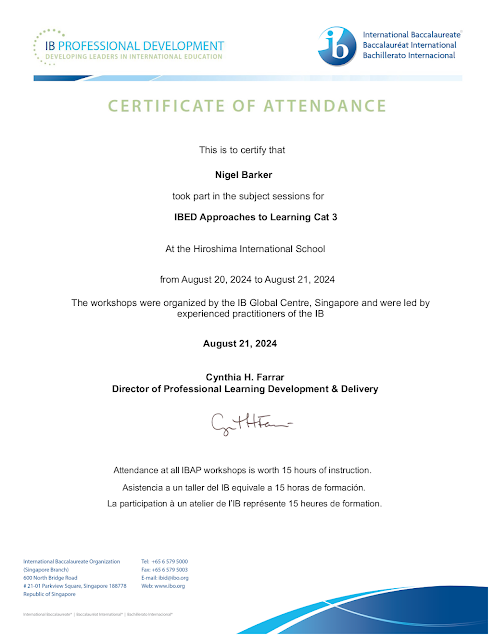Nigel S. Barker
International Teacher and Systems Administrator
Thursday, 18 December 2025
Friday, 23 August 2024
Wednesday, 19 April 2023
Wednesday, 23 March 2022
Thursday, 24 June 2021
Minset in Mathematics - End of Year
Students were shown several videos from the Stanford EdX course "How to Learn Math: for Students" over the course of the school year.
At the end of the year (June) they were given the same survey questions that they had answered before watching anything (August).
The questions are taken from the online course itself, and I have identified three categories in which to group them. The questions were not asked in this order.
The scale used is
1: strongly agree
2: somewhat agree
3: somewhat disagree
4: strongly disagree
The numbers are percentage of grades 7 and 8 students.
Attitude Towards Mathematics
Not a great change in the distribution, still roughly 60% of students enjoy maths and don't find it boring, but only 30-40% enjoy being challenged to solve difficult problems. A slight shift towards a more positive attitude was observed on all questions of this type.
Nature of Mathematics
The message of the online course was mostly targeting the misconceptions commonly held that mathematics is difficult for most people and that there isn't much they can do about it.
It is clear from the responses here that the message was well-received by students and we can see a definite shift towards more positive attitudes.
Perception of Ability
Half of students expressed negative self-perception of mathematical
ability in most such questions, though they believe they can do well,
if they make enough
effort. This confidence has grown since the beginning of the year, again influenced by the message of the videos, it seems. There was a video about growth mindset and likening mathematical to sporting ability in terms of the benefits of training.
Friday, 2 April 2021
Sunday, 7 March 2021
Mindset in Mathematics
Grades 7 and 8 were surveyed using the introductory questions from the Stanford EdX course "How to Learn Math: for Students". There were 22 responses. E-mail addresses were collected to facilitate possible targeted follow-up. Students were told that this was to help my study (I showed them the course), and to answer honestly.
The questions fall into three broad categories - attitude towards maths (enjoy or not), perception of ability, and opinion about the nature of maths.
Summary
Roughly 60% of students enjoy maths and don't find it boring, though only 30-40% enjoy being challenged to solve difficult problems.
40-50% of students believe there are people who are naturally good at mathematics, and that there isn't much you can do to become one of them. Presumably they feel that more effort would enable them to do well without becoming a maths person.
40-50% of students characterised mathematics as a subject where it was important to remember methods, though most also saw it as creative and with many interconnected ideas.
50-60% of students expressed negative self-perception of mathematical
ability in most such questions, though 60% believe they can do well,
rising to a massive 90% who believe they can do well if they make enough
effort. This is quite a surprise to me, and very encouraging.
Overall, roughly half of respondents feel positively about mathematics, and do not agree with the typical negative stereotype answers that might dominate in a western classroom. The next step is to target the other half.












